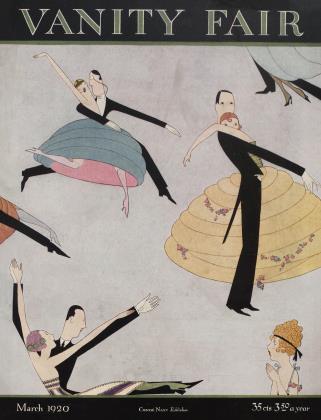Sign In to Your Account
Subscribers have complete access to the archive.
Sign In Not a Subscriber?Join NowImaginary Obituaries
Percy Stickney Grant. Why Not Estimate a Celebrity While He Is Still Alive?
JOHN JAY CHAPMAN
THE Reverend Percy Stickney Grant has passed away,—or rather he has passed along, having been sent, in spirit, along with the latest batch of Pilgrims. He steamed down the bay yesterday on the Tug "Caprice" in charge of special investigators Cafaretti, Schwanbogen, and McGonaghil.
We cannot allow this well-known figure to disappear from our midst without a word of praise for his indomitable persistency under most trying circumstances, and without our felicitations to him upon his final triumph.
Percy Grant was a man of note; and yet for years no one paid much attention to him. He struggled on, observed but not heeded, while doing and saying things that would have excited comment in any one else. His eccentricities were accepted with a maddening indulgence that would have embittered a lesser man.
The town was willing to look at him, but not to listen to him. Long before he came to this city he had been doing vigorous, obtrusive things which made his name known to us. He swam about like an Episcopal dolphin, surged by us and flashed his tail above us,— then rushed to China and round back again through the Isthmus of Panama to MacDougal Street and Washington Square. Percy was at large; but a porpoise is not an alarming beast and does not require the really serious attention of anyone.
When he bobbed up in the Church of the Ascension twenty-five years ago, he immediately set up a small, chaste, and comfortable circus in the back yard of his rectory, and began that series of "Talks by the Under Dogs," of which we all mildly approved and tried to be proud. We felt it was good that there should be a warm forum where respectables could meet disrespectables, and learned men see what humanity looked like.
Visitors to the city were often toted to the show. William James came on from Cambridge and poked into the ferment with his metaphysical yard-stick, but said nothing. The show did not excite deep emotion. It aroused neither admiration or disgust.
ALL this while the Rev. Percy was really a good fellow, a kind person, perhaps a little clothy and important, perhaps more pompous-minded than anyone has a right to be. But the trouble was that he and his circus were a failure; his agitation didn't agitate. His bombs wouldn't go off.
For instance:—In 1915 he concocted the following, "If marriage is founded on the affections of two persons for each other, as marriage in America is supposed to be: with the disappearance of such sentiment disappears the only ground for marriage." The Rev. Percy hurled this perfectly good bomb, and nobody minded. All felt inwardly that Percy was harmless.
But a good time was coming. The cloying atmosphere of benevolence which surrounded the revolutionary evaporated when the war came on. The experience our people then went through as to the relation between talk and dynamite made us afraid of the Rev. Percy. But he didn't know this; and he had, by constant intercourse with underlings, and his continuous disappointments as an agitator, been sharpening up his style and exaggerating hismetaphors, hoping ever that some day he would say something that the town would take note of. He did it. On December 27, the day of the sailing of the Soviet Ark, the gem popped out of him. After calling attention to the fact that the sailing of the Buford had occurred on the 300th anniversary of the arrival of the Mayflower, Dr. Grant continued:
"'However, to-day's sailing of the ark will take an equally important place in American history. To send 300 or 300,000 men away and try to stop the growth of ideas is not going to be successful. It is a fruitful and successful method for advertising a cause and enlisting friends. It reflects discredit on the much-boasted American free speech. There have left our shores to-day 300 ambassadors to disseminate hatred to America. If the Government is adopting a wholesale policy of deporting every one who is not satisfied with it, there will be a lot of arks busy with a passenger list much greater than 300.'"
THIS was worth waiting for. It was a novel, wonderful, introverted, incredible, magnificent, piece of nonsense, which everybody could enjoy. . Henceforward Percy was a made man. His church was in a frenzy over him. The Bishop hesitated to reprimand him; for where were the proofs? And who could tell whether. Percy's whole congregation would not secede, if the birch was laid on Percy's broad back? Perhaps all Lower Fifth Avenue believed that the deported Reds and the Pilgrim Fathers were much of a muchness. Percy's Clubs discussed his expulsion. Newspapers wrote leaders about the atrocious utterance.
It was Percy's day, the bright and shining day for which the Rev. Percy had waited so long—and so very patiently.
While we are sorry to lose Percy, we congratulate him. He must have had something in him after all, or he never could have scored such a bull's-eye, just as we were all in despair over his career. We wave him a fond adieu, and we must also give our heartiest thanks and a word of advice to those excellent public servants, Messrs. Cafaretti, Schwanbogen, and McGonaghil. Let them guard him well till the high seas are reached, for the Rev. Percy knows how to swim.
 View Full Issue
View Full Issue












Subscribers have complete access to the archive.
Sign In Not a Subscriber?Join Now